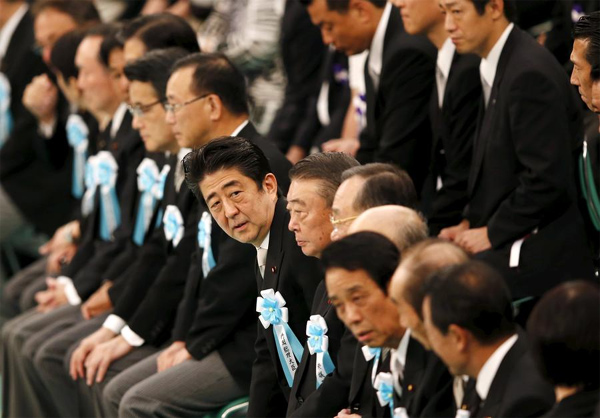 |
|
Japan's Prime Minister Shinzo Abe (C) attends a memorial service ceremony marking the 70th anniversary of Japan's surrender in World War Two at Budokan Hall in Tokyo August 15, 2015. [Photo/Agencies] |
German Chancellor Angela Merkel laid a wreath at the grave of the Unknown Soldier, close to the Kremlin on May 10. Along with other Western leaders, she skipped the military parade in Red Square marking the 70th anniversary of victory over Nazi Germany in protest over Russia's annexation of the Crimean peninsula and its role in eastern Ukraine.
Japanese Prime Minister Shinzo Abe wants to follow the example of Merkel.
China has invited Abe, among other world leaders, to the events in Beijing on Sept 3 to observe the 70th anniversary of its victory over the Imperial Japanese army.
Japanese media reported that Abe wants to take the invitation as a chance to visit China and have a summit meeting with Chinese President Xi Jinping but does not want to attend the military parade in Beijing.
The Mainichi Shimbun even published the details of Abe's Beijing visit, which it said would start in the afternoon of Sept 3.
However, China's foreign ministry said the invitation to Abe was for the ceremonies, not an invitation for an official visit.
Abe has had no formal summit meetings with the leaders of China and the Republic of Korea since he became prime minister for second time in December 2012; although Xi has talked with him briefly on the sidelines of two international conferences.
While Abe wants to take Merkel as his role model, he should know that the German leader was at the commemorations in Normandy, France, in June for the ceremonies marking the Allied troops' D-Day landings on June 6, 1944.
Germany has taken painstaking efforts to achieve reconciliation with the countries Nazi army invaded.
But Japan's soul-searching over its wartime behavior lags far behind that of Germany.
While Abe may think that he has succeeded in achieving a closure for Japan's war past by using the words "aggression", "colonial rule", "deep remorse" and "apology" that people had urged him to say in his address marking the 70th anniversary of the World War II, the ruling Liberal Democratic Party he is leading is showing its true colors, putting Abe's sincerity in doubt.
Japanese cities' boards of education are busy deciding on the textbooks for local junior high schools for the next four years before the month ends. A group of LDP lawmakers close to Abe have asked the local legislators from the party to sway the boards in their assemblies. They are trying to have more textbooks with a conservative slant used in Japan's schools.
Yokohama and Osaka have picked the textbooks published by Ikuhosha Publishing House, which is affiliated to the conservative Japan Society for History Textbook Reform.
Ikuhosha's history textbooks differ from others in their version of Japan's modern history, stating that while Japan started the Pacific War to "secure natural resources in the southern region", the nation also aimed to "liberate Asia, which was under the colonial rule".
Japan's textbooks have drastically changed as a result of the Abe Cabinet's "reconstruction of education".
Abe needs to realize that it is not the way Germany has dealt with its war history if he takes Merkel as his role model. Japan should stop saying one thing but doing another.
The author is China Daily's Tokyo bureau chief. [email protected]

I’ve lived in China for quite a considerable time including my graduate school years, travelled and worked in a few cities and still choose my destination taking into consideration the density of smog or PM2.5 particulate matter in the region.